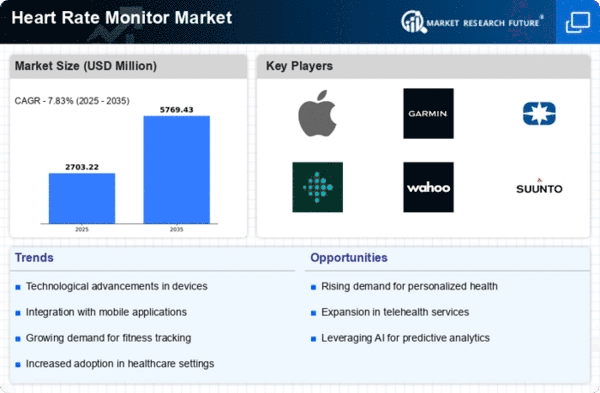Market Analysis
In-depth Analysis of Heart Rate Monitor Market Industry Landscape
The Heart Rate Monitor market is witnessing dynamic trends that reflect the increasing emphasis on personal health and fitness. One significant trend driving the market is the growing awareness of the importance of monitoring heart rate for overall well-being. As individuals become more health-conscious, there is a rising demand for wearable devices equipped with heart rate monitoring capabilities. These devices, ranging from smartwatches to fitness trackers, provide users with real-time data on their heart rates, enabling them to make informed decisions about their physical activities and health.Technological advancements play a pivotal role in shaping the market trends of Heart Rate Monitors. Continuous innovations in sensor technology, signal processing, and connectivity have led to more accurate and reliable heart rate monitoring devices. The integration of advanced features such as sleep tracking, stress monitoring, and GPS functionality further enhances the value proposition of these devices, catering to a broader spectrum of health and fitness needs. As a result, consumers are increasingly inclined to invest in Heart Rate Monitors that offer a comprehensive set of features for a holistic approach to health management.
The market is also witnessing a shift towards personalized and adaptive health monitoring. With the help of artificial intelligence and machine learning algorithms, Heart Rate Monitors can analyze individual patterns and provide personalized insights and recommendations. This trend aligns with the broader movement towards precision health, where healthcare and wellness strategies are tailored to an individual's unique characteristics and needs. The ability of Heart Rate Monitors to adapt to users' evolving health goals and provide personalized guidance positions them as essential tools in the modern approach to proactive health management.
Moreover, the integration of Heart Rate Monitors into the healthcare ecosystem is a notable trend. Healthcare professionals are increasingly recognizing the value of continuous and remote heart rate monitoring for managing chronic conditions and post-treatment recovery. The ability of Heart Rate Monitors to transmit real-time data to healthcare providers allows for more proactive and timely interventions, contributing to improved patient outcomes. This trend indicates a growing convergence of consumer health technology and clinical applications, expanding the role of Heart Rate Monitors in the broader healthcare landscape.
The market is witnessing a proliferation of diverse form factors and designs in Heart Rate Monitors, catering to different user preferences and lifestyles. From chest straps and finger sensors to wrist-worn devices, consumers have a wide array of options to choose from based on their comfort and usability preferences. This diversity in product offerings contributes to the democratization of heart rate monitoring, making these devices accessible to a broad spectrum of users with varying needs and preferences.



















Leave a Comment